Addressing the WHO Metal Health Forum held in Geneva on 14 October 2019, Sri Lanka updated the global healthcare community, which comprised policy experts and representatives of Member States and international organisations, on progress achieved in advancing mental health, providing healthcare support and improving the working environment that could foster good health and wellbeing among the Sri Lankan population.
The intervention made by Ambassador A.L.A. Azeez, Permanent Representative of Sri Lanka in Geneva at the Forum dealt with three main points namely, the need for mental healthcare and delivery of assistance to be holistic; the importance of an inclusive approach that ensured availability of mental healthcare coverage throughout the entire cycle of vulnerability; and the sustainment of a supportive environment that assured security, empathy and care for at-risk individuals.

“Preventing the threat of use of biological agents is a key priority for Sri Lanka”, stressed Sri Lanka Permanent Representative in Geneva Ambassador Azeez, addressing the International Seminar convened by the Geneva Centre for Security Policy (GCSP) and the Implementation Support Unit (ISU) of the Biological Weapons Convention (BWC) on 'the importance of disease surveillance and alert mechanisms: lessons for the BWC’ held on 20 November 2018.
The Seminar focused on the operationalization of Article 7 of the Biological Weapons Convention (BWC), which accentuated the importance of technical assistance and international cooperation, to respond effectively to epidemics involving bio-agents.
Representing Sri Lanka at this health - security interface forum, Ambassador Azeez explained the existing disease surveillance mechanism in Sri Lanka, which comprised a wide range of medical and administrative networks including at national, provincial, and district levels. He also drew attention to the role and contribution of hospitals and primary health care units in addressing this challenge efficaciously as well as to laws and policies in place in this context. “Continuing work on strengthening the existing system involved further updating of policies and programmes to empower the National Disease Surveillance System as part of an integrated health-security mechanism”, he added.

The WHO Global Coordination Mechanism for the prevention and control of Non-Communicable Diseases (GCM/NCD) concluded its General Meeting in Geneva on 6 November 2018. The two- day Conference brought together delegates and activist from Member States, UN organizations, and non-State Actors. The participants along with other stakeholders from the private sector, philanthropic foundations, and academic institutions, discussed means and modalities of strengthening the implementation of the SDG Agenda- 2030 and follow-up on the Political Declaration adopted at the Third High-level Meeting of the General Assembly in September 2018 on the prevention and control of NCDs.
Under the co-chairmanship of Ambassador Azeez, Permanent Representative of Sri Lanka, and the Representative of the host country, Switzerland, the Meeting facilitated stakeholder interactions at policy and political levels, regarding enhancing the effective coordination of prevention and control-related activities. The continued importance of multidisciplinary and multisectoral engagement, aimed to promote implementation of the WHO Global NCD Action Plan 2013-2020, and SDG 3.4 - NCD-related targets, was emphasized as was the need for building upon the existing networks of stakeholders bringing in industries, research institutions and local government bodies. A primary objective of the GCM was to assess and renew commitments that had emerged from the recently held UN High-level Meeting of the General Assembly, and its preceding High-level Conferences in 2011 and 2014.
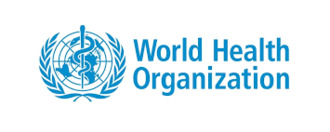
Several delegations congratulated Dr. Rajitha Senaratne, Minister of Health, Nutrition, and Indigenous Medicine of Sri Lanka on being elected as a Vice-Chair of the Executive Board (EB) of the World Health Organization (WHO) for a term of one year during the 143rd session of the EB/WHO held in Geneva from 28-29 May 2018. Sri Lanka currently serves as a Member of the Executive Board, elected for a term of three years in May 2017.
Members of the South East Asia Region (SEAR) unanimously nominated Dr. Rajitha Senaratne to the post of Vice-Chair from SEAR.
Dr. Senaratne thanking the Executive Board on his election, emphasized the necessity of learning from the experiences of peers, while sharing Sri Lanka’s experiences with them towards achieving Universal Health Coverage, a goal agreed in the UN Development Agenda 2030.
During his participation of the 71st session of the World Health Assembly (WHA71) and the 143rd session of the Executive Board meeting (EB143) of the WHO, Sri Lanka received special compliments as a country which has taken progressive measures towards realization of SDG 3-Universal Health Coverage and launched bold initiatives on control of NCDs and access to affordable medicines.
Minister Senaratne had been invited to address the Panel Discussion – ‘Saving lives, Spending less: A Strategic Response to Non-Communicable Diseases (NCDs)’ jointly organized by the WHO and the WHO Goodwill Ambassador for NCDs Mr. Michael Bloomberg, on the sidelines of WHA71 in recognition of Sri Lanka’s achievements in the health care sector under his stewardship.
Permanent Mission of Sri Lanka
Geneva
30 May 2018
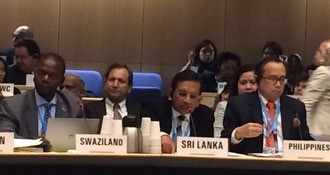
Dr. Tedros Adhanom Ghebreyesus, the Director General (DG) of the World Health Organization (WHO) announced today in Geneva during the 142nd Session of the Executive Board of the WHO that the World Health Day 2018 will be celebrated in Sri Lanka. This year’s theme will be the Universal Health Coverage (UHC).
The DG congratulating Sri Lanka which celebrates the 70th Anniversary of its Independence next month, said "there is no more fitting place for this event, as you know, Sri Lanka has a long history of providing free healthcare for its people.”
The Dengue Epidemic that has become a concern in Sri Lanka for the past few months is successfully brought under control by the measures taken by the relevant government authorities and collective effort of the general public alike, Sri Lanka Tourism confirms. Reported cases have dropped by 35-40% since mid-Julyaccording to the sources of Ministry of Health. Regular campaigns were implemented to educate, clean up areas and other preventive measures have been taking place to control the spreading of the disease under guidance and surveillance of the Ministry of Health of Sri Lanka.

Minister of Health, Nutrition and Indigenous Medicine Dr. Rajitha Senaratne addressing the 70th World Health Assembly (WHA) meeting in Geneva on Tuesday (23 May 2017) said that the “Sri Lanka has achieved much progress in health care delivery due to cost-efficient use of resources and the coordinated use of its well ingrained primary, secondary and tertiary health care facilities”.

Participants from a cross –regional group of countries meeting in Colombo at the 2nd Global Consultation on Migrant Health, adopted the ‘Colombo Statement’, the first ever stand-alone political statement on the subject of Migrant Health, during the High Level meeting of the Consultation held on 23rd February 2017, under the patronage of H.E. the President Maitrhipala Sirisena, and Chaired by Health and Indigenous Medicine Minister Rajitha Senaratne The statement adopted, was negotiated in Geneva under the Chairmanship of Sri Lanka’s Permanent Representative to the UN Ambassador Ravinatha Aryasinha with the representatives of the Permanents Missions in Geneva, following an the initial draft jointly developed by the IOM, WHO and the Government of Sri Lanka.
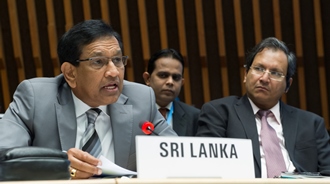
Delivering a keynote addressed at the World Health Organisation (WHO) meeting on ‘Rehabilitation 2030: A Call for Action’, in Geneva on Monday (6th February) Minister of Health, Nutrition and Indigenous Medicine Dr Rajitha Senaratne said that the Government of Sri Lanka has identified Rehabilitative Health Services as the third pillar of Sri Lanka’s health care delivery system, in addition to the earlier focus on curative and preventive health services. Minister Senaratne was invited by the WHO, together with Minister of Health of Botswana and Deputy Minister of Health of Lao People’s Democratic Republic to deliver the keynote addresses at the meeting, and share the experience of their country efforts in rehabilitation services.

Director General of the World Health Organsiation Dr. Margaret Chan commended the efforts made by the President Maithripala Sirisena in his capacity as the former Minister of Health in advancing the health sector in Sri Lanka. The Director General made these remarks at a side –event on Non – Communicable Diseases (NCDs) which was attended by President Sirisena on the side – lines of his visit to the 71st Session of the United Nations General Assembly on 22nd September 2016.
The event which was co –hosted by the Government of Russia and the World Health Organisation(WHO) launched the Friends of the United –Nations Inter – Agency Task Force on prevention and control of NCDs initiative and provided an overview of the current work of the Task Force, showcasing action at country level, discuss on supporting Member States to achieve the NCD-related Sustainable Development Goals, and outlining a number of global joint programmes that now require funding in order to become operational.

21 July 2016 Today Sri Lanka received certification from WHO for having eliminated lymphatic filariasis - one of the oldest and most debilitating, neglected tropical diseases. WHO Regional Director, Dr Poonam Khetrapal Singh, presented the certificate to Minister of Health, Dr Rajitha Senaratne, at a ceremony in Colombo.
“The Ministry of Health has prioritized the elimination of this neglected tropical disease for several decades. We have now reached a major turning point, eliminating lymphatic filariasis as a public health problem," said Dr Rajitha Senarathne, Minister of Health, Nutrition & Indigenous Medicine.


Minister of Health, Nutrition and Indigenous Medicine Dr Rajitha Senaratne on Tuesday (24 May 2016) drew the attention of the 69th World Health Assembly (WHA) meeting in Geneva to the recent floods and landslides in Sri Lanka that affected nearly half a million people and appreciated the expression of solidarity and support by countries, partners and the World Health Organization (WHO), to strengthen the timely health response to the affected people.
Addressing the Assembly under this years’ theme, “Transforming our World: the 2030 Agenda for Sustainable Development “, Minister Senaratne stated that “the Government of Sri Lanka is fully committed to the Sustainable Development Agenda and has already set up a multi sectoral Sustainable Development Secretariat to achieve this goal”. Drawing attention to the increasing influx of migration, Minister highlighted the need to pay attention to the health of migrants, irrespective of their status of migration. In this context, he recalled the offer made by the President of Sri Lanka to host the second Global Consultation on Health of Migrants in Sri Lanka October this year, and stated that Sri Lanka is envisaging a political declaration as the outcome of the Global Consultation to demonstrate the commitment to this important issue.

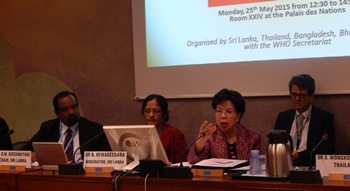
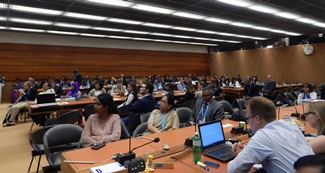
Dr. Margaret Chan, the Director General of the World Health Organization (WHO) has said "“Pictorial warning is the most cost effective means of controlling tobacco related Non Communicable Diseases (NCDs), including cancer “, and that "countries can get return on their investment in multiple areas". Paying tribute to countries including Sri Lanka whom she said "had the courage to keep going despite heavy resistance by the tobacco industry", Dr. Chan said "without our joint effort, you know what effect tobacco would take. We should not allow an industry to intimidate governments, make money and leave you with all the health consequences". She urged that "the international community come together to fight the tobacco industry".
Dr. Chan made these observations when she inaugurated a session on the theme “Strategies to overcome resistance against pictorial warning messages in tobacco products”, hosted by Sri Lanka on the sidelines of the 68th World Health Assembly at the Palais des Nations in Geneva on Monday (25th May 2015).



Minister of Health and Indigenous Medicine Dr Rajitha Senartne today (19 May 2015) addressed the 68th World Health Assembly held in Geneva and highlighted the progress Sri Lanka has made in achieving the Millennium Development Goals and universal health coverage, particularly with respect to Maternal & Child Health and the control of communicable diseases.
Highlighting the health scenario in the country he said that under the guidance of President Maithripala Sirisena, the country is poised to enter a new phase of health development and pointed out that the health burden of the country is now moving more towards non communicable diseases, such as cardiovascular, respiratory neoplasm and diabetes, which account to over 70% of deaths.

Minister of Health and Vice President of the 67th World Health Assembly, Maithripala Sirisena, addressing the World Health Assembly today (20th May 2014) said “the World Health Assembly has a historic opportunity to once again appeal to the world community to demand those countries releasing large amount of carbon-dioxide and offensive gases to the atmosphere - to adopt carbon free energy sources to run their industries. These developed nations should be held responsible for releasing large quantities of offensive gases, and the people in developing and poor countries are the victims that have to bear the consequences. Let us all be eco-centered rather than ego-centered so that we can all live happily and with good health and leave to the future generations a much better and a healthy place to live in.

Hon Minister Maithripala Sirisena addressesthe 65th World Health Assembly in Geneva
The Sri Lankan delegation headed by the Hon Minister Maithripala Sirisena participated at the 65th World Health Assembly which concluded in Geneva last week. The assembly which took place at the United Nations Headquarters in Geneva was attended by more than 190 Member States, UN bodies and Civil society representatives. Addressing the assembly on the second day, the hon. Minister outlined the achievements and developments taking place within the medical and health spheres in Sri Lanka and further elaborated on Sri Lanka’s future plans.
Sri Lankan delegation states that the country has successfully managed to control and contain the HIV epidemic on 27th July 2007 under Agenda item 7 (h) at Substantive Session of the Economic and Social Council (ECOSOC) held in Geneva.
Here is the full text of the Statement.
Statement by Sri Lanka delegation (by Mr. O.L. Ameerajwad, Counsellor) under Agenda item 7 (h) at Substantive Session of ECOSOC 2007 on 27 July 2007
Mme. President, Director General, Excellencies, ladies and gentlemen,
First let me congratulate you Mme. President and our Vice Presidents for your election to this high office.
On behalf of the Government and the people of Sri Lanka I wish to offer my special congratulations and best wishes to our Director General, Dr Margaret Chan for being elected to lead this Organization for the next five years. With the exceptional commitment and leadership that Dr. Chan brings to her work, we have the utmost confidence that WHO and the future health of the world, is in very safe hands.
Mr. President, Your Excellencies and distinguished delegates.
Mr President,
I extend our congratulations and best wishes to you and the Vice-Presidents of this Assembly.
On behalf of H.E. the President Mahinda Rajapaksa, the Government and people of Sri Lanka, I wish to extend our deepest condolences on the sudden passing away of Director General Dr. Lee Jong-wook. We extend our sincere condolences to the family of Dr. Lee and to the larger family of WHO in their moment of grief for a leader who brought effective management and a new vision to this organization. Sri Lanka will not forget Dr. Lee’s visit to Sri Lanka in the midst of our tsunami crisis to offer the support of WHO in our time of need.
Mr. Chairman,
Distinguished delegates
I felicitate you Mr. Chairman and the Bureau on your well-deserved election and assure you of the full cooperation of the Sri Lanka delegation in the successful conduct of this important conference.